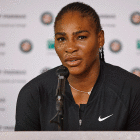Since the early 2000s, Serena Williams' name has evoked praise as one of the most consistently dominant tennis players of her generation.
In 2018, however, Williams' name has also evoked controversy in the wake of her heated debate with umpire Carlos Ramos during the US Open women's final.
Fans, media and fellow tennis standouts have aligned on either side of the Williams debate: Was Serena justified in arguing Ramos' penalties for alleged illegal coaching, or was she just a bad sport? Ramos, remember, docked the 23-time Grand Slam winner a point after she broke her racket in anger, but countless others, including sport legends like Billie Jean King, have suggested the six-time Open champion was also a victim of both sexism and outdated rules.
Even Williams' own appearance on this week's cover of GQ as a Woman of the Year honoree couldn't escape controversy, with critics nitpicking how the magazine's artist depicted "Woman" in quotations.
Williams herself believes it's all a testament to society's volatility.
"I feel like we need to shift to that mindset, you know," she told GQ. "It's not just me, it's the way the country is."
As for the US Open incident that stirred everything up, however? That, Williams said, can be attributed more to the kind of injustice proposed by King and her other defenders.
"You do research on how black women, you know, in the workforce are -- there's literally papers about it, how black women are treated if they're angry, as opposed to white women, white men, black men," she said. "It is bottom of the bottom of the totem pole."
Williams, who received Woman of the Year recognition for returning in triumph to tennis following the September 2017 birth of her daughter, went on to mention new U.S. Supreme Court justice Brett Kavanaugh as an example of unfair treatment. Alabama state senator candidate Deborah Barros tweeted during Kavanaugh's nomination process that it's "funny how a black female tennis player is held to a higher standard to keep her emotions in check than a Supreme Court nominee." In talking to GQ, Williams agreed.
"Kavanaugh's a white man," she said. "I'm a black woman. His limit is higher. My limit is way lower. And that's where we stand right now in this world. And it's a fact. It is literally a fact. If you don't believe anything I say, just look at those two examples."





















